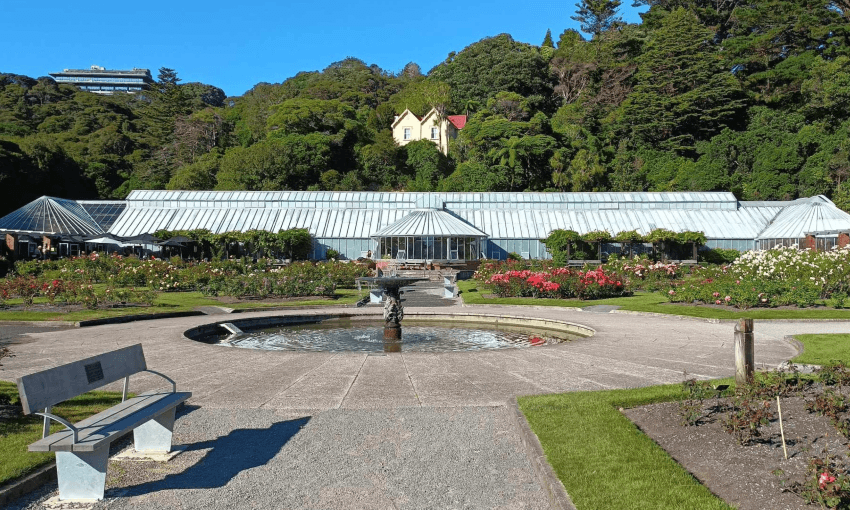The same councillors who decry excessive spending on pet projects just voted to pump millions of dollars into a greenhouse for flowers.
On Thursday last week, Wellington City Council voted to consult on repairing Begonia House, the greenhouse for exotic flowers in Wellington Botanic Garden. The options for repairs range from $11 million to $20 million. Mayor Tory Whanau initially left the repairs out of the council’s long-term plan, deeming them non-essential spending. However, a public campaign by Friends of the Wellington Botanic Garden, supported by conservative councillors, showed there was significant support for the greenhouse among some parts of the community. Whanau agreed to introduce an amendment to consult the public on repair options, which passed with majority support.
I have no take on Begonia House. I’ve been there once. It was nice. It’s a building full of flowers. Is it worth the cost to fix it? I guess it depends how much you like flowers. To some people, it’s a core part of their lives. Others might prefer the money be spent on libraries or playgrounds or simply not spent at all. The balance of whether it is worth saving is a judgment call based on your personal and community values. But there’s one thing that is worth pointing out: Begonia House is not an essential service. It’s a house for flowers. It is quite literally a nice-to-have.
The term “nice-to-have” has been tossed around a lot recently in the context of council spending, mostly by the same people who led the charge to save the Begonia House.
Diane Calvert, a strong supporter of Begonia house, who introduced an (unsuccessful) amendment to take the option of demolition off the table, told the NZ Herald last year that Wellington should cut back on “nice to haves”. Even in Thursday’s meeting, she said the council needed to “start looking at where we can save some money because people are doing it tough”.
Tony Randle, who seconded Calvert’s amendment, told Michael Laws in a recent interview on The Platform that “we should be focusing all our resources towards fixing our pipes”. In the same interview, he admitted Begonia House was “not a key service”.
Nicola Young, who supported the amendment, said this while responding to a questionnaire from the Oriental Bay Residents Association: “Sadly, there is little political will to have a hard look at some of the ‘nice-to-haves’ at a time when council’s income has dropped.”
Ray Chung, in an interview with The Post, said, “The city must get the infrastructure right before they look at spending money on nice to haves.” And yet, when given the chance to cut spending on a flower house, he called it “an affront to Wellingtonians”.
Calvert, Young, Randle and Chung are going to campaign by complaining about rate rises and council spending on “nice-to-haves” but the reality is, they’re happy to spend money on nice-to-haves when it matters to them. And that’s OK. They should do that.
It’s nice that Wellington has a greenhouse for flowers. It’s also nice that the city has libraries, playgrounds, paved roads, rubbish collection and sewerage. When the early British settlers arrived in Te Whanganui a Tara, none of that existed. The township’s Board of Works, the precursor to Wellington City Council, had to decide which stuff to prioritise and which was less important.
For all their flaws, Wellington’s colonial founders were quite forward-thinking when it came to urban design, as demonstrated in the original instructions from the New Zealand Company to town planner William Mein Smith:
“You should make ample reserves for all public purposes, such as a cemetery, a marketplace, wharfage, probable public buildings, a botanical garden, a park and extensive boulevards. It is indeed desirable that the whole outside of the town, inland, should be separated from the country sections by a broad belt of land which you will declare that the company intends to be public property on condition that buildings be never erected upon it.”
The Botanic Garden itself could easily be described as a “nice-to-have”. The city would still function perfectly well without it. And yet, Wellington has always acknowledged that “nice-to-haves” are an essential part of urban design, because nice things improve the quality of life and make people want to live in a city. Sometimes nice things can be provided by the private sector, but sometimes the public sector is the only option. It would be great if we could quantify every council investment with a cost-benefit ratio or an expected quality of life increase, but most of the time that is impossible. How can you calculate the net benefit of a playground? Or a water fountain? Or, indeed, a glasshouse for flowers?
Despite some politicians believing that councils should be a mere rubbish collection and pipe repair service, the Begonia House debate shows there is a clear expectation from the public that councils should do more than that. Wellingtonians want their city to have nice things.



